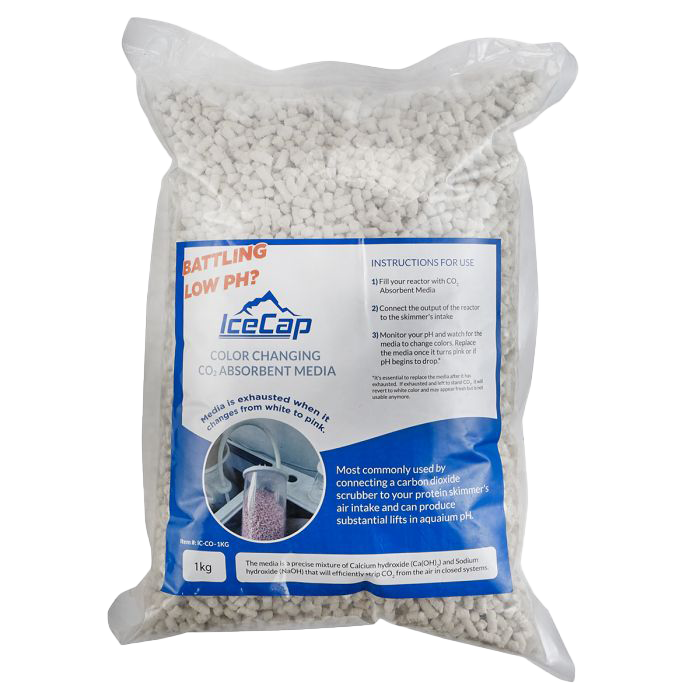IceCap Color Changing CO2 Absorbent Media 1Kg
IceCap Color Changing CO2 Absorbent Media 1Kg
Couldn't load pickup availability
Share
IceCap CO2 Absorbent Media can quickly deliver results, raising the pH in your aquarium through the reduction of excess dissolved carbon dioxide. We are constantly breathing carbon dioxide (CO2) into the air, and in our homes this can quickly build up and begin to dissolve into the water in our aquariums. The result is carbonic acid, which depresses the pH. This is actually the primary cause of low pH in most aquariums. This effect can be significant, and especially in the presence of corals this can negatively impact coral growth and overall health.
Features
- Media changes from white to pink when exhausted
- Perfectly sized pellets for minimal dust and maximum performance
- Calcium hydroxide (Ca(OH)₂) and Sodium Hydroxide (NaOH) based media
In some situations, getting fresh air into the room, such as by opening a window and exchanging stale air with fresh air, can actually be enough to take care of the problem. Some people will even pipe a fresh air intake through an outside wall over to their aquarium. Depending on your location and the season, this isn't always a practical or long-term solution. Thankfully, with the use of a CO2 media reactor, it's simple and affordable to lower the CO2 in your aquarium and see an almost immediate increase in your pH.
The pH in a reef tank should be around 8.3 for optimal coral growth. If you’re struggling with chronically low pH despite your alkalinity being spot-on, using a lime-based CO2 absorbing media and connecting a CO2 scrubber to the air intake of your protein skimmer is a great way to increase and keep your pH level within the ideal range.
Instructions for use
- Fill your reactor with CO2 Absorbent Media
- Connect the output of the reactor to the skimmer's intake
- Monitor your pH and replace the media once it turns pink or if pH begins to drop.
Once the media has completely changed colors from white to pink, you'll want to take the old media out (it cannot be regenerated) and replace it with new media.
In terms of frequency, it's going to vary from hobbyist-to-hobbyist for a variety of reasons, including the aquarium itself and the environment in which it is located (your home, office, etc.). But as a general rule of thumb, you'll want to be prepared to change the media every two weeks (14 days). We recommend always have extra media on hand. That way, you'll never be caught in a situation where the parameters you've worked hard to stabilize begin to shift.
Tip: It’s essential to replace the media after it’s exhausted. If exhausted and left to stand, it will revert back to a white color. It will appear to be fresh, but it is not usable anymore.

Oh now running at 8.2 vs 7.8

